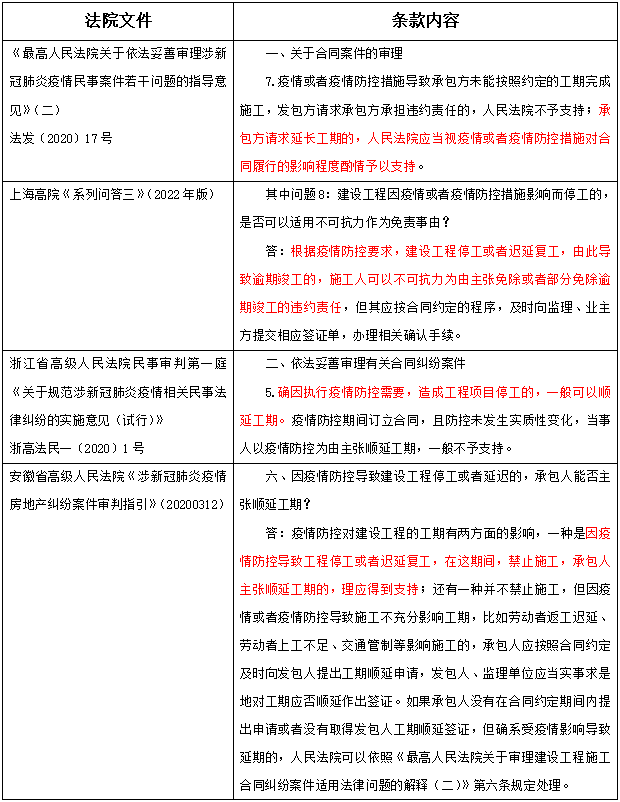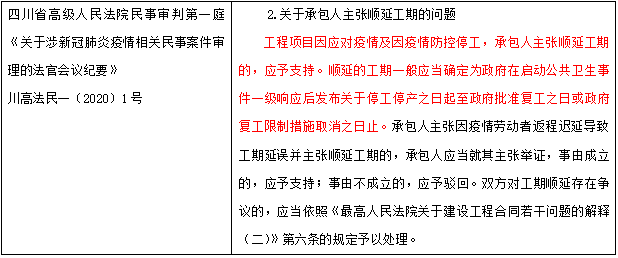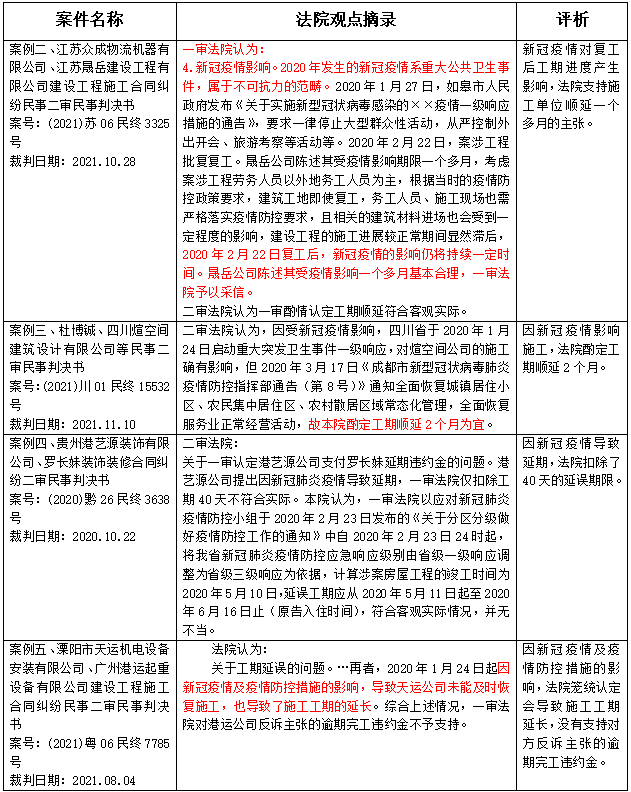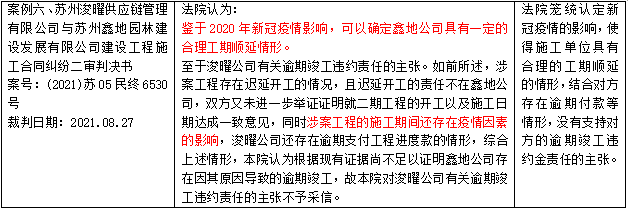Epidemic related Legal Practice Series | What about the postponement of the construction period under the COVID-19
The epidemic situation of novel coronavirus pneumonia (hereinafter referred to as "COVID-19"), which broke out in Wuhan, Hubei Province in January 2020, has developed rapidly and spread throughout the country. At that time, the whole country was fighting the epidemic; After the epidemic has been effectively controlled, it has entered the normalization stage of epidemic resistance.
In March 2022, the variant strain of Omikron COVID-19 virus swept through the beautiful city of Shencheng. In order to curb the spread of the epidemic, the whole city was closed down and controlled, with residents staying indoors, businesses shutting down and production halting, and the whole city was united in fighting the epidemic.
The construction engineering industry is characterized by a long construction cycle, multiple links, capital intensive, and numerous employees. It is an industry that is seriously affected by the epidemic. Under the control of the COVID-19 and the government's fight against the epidemic, the normal construction of construction projects will be greatly affected, often leading to delays in the construction period. Construction enterprises are particularly concerned about the reasons and days for the extension of the construction period. Therefore, the author combines the court's guiding opinions and judicial decisions to discuss the issues of the extension of the construction period under the COVID-19 epidemic.
1、 Guidance document for postponing the trial under the COVID-19
During the more than two years of epidemic resistance, the Supreme People's Court issued the Guiding Opinions of the Supreme People's Court on Several Issues Concerning the Proper Trial of Civil Cases Involving the COVID-19 in accordance with the Law (I), (II) and (III) on April 14, 2020, May 15, 2020 and June 8, 2020 respectively; Local courts have also issued local trial guidance documents before and after the trial.
In order to better respond to the new situation and new problems of the current round of epidemic prevention and control and economic and social development, the Shanghai High Court issued the Third Series of Questions and Answers on the Application of Laws in Cases Involving the COVID-19 Epidemic (2022 Edition) on April 10, 2022 [hereinafter referred to as the Third Series of Questions and Answers of the Shanghai High Court (2022 Edition)].
On the whole, in the case involving the COVID-19, although there are some differences in the focus of the courts around the country, they basically believe that the epidemic situation and the prevention and control measures can constitute force majeure, and those directly affected by the epidemic situation or the prevention and control measures of the epidemic situation that meet the legal requirements of force majeure shall be dealt with according to the relevant provisions of force majeure. At the same time, in the trial of epidemic related cases, the court strictly grasps the applicable conditions of force majeure. If a party claims partial or total exemption from liability due to force majeure, it shall bear the burden of proof for the fact that the civil obligation cannot be partially or completely performed due to force majeure. When applying the law, the court will comprehensively consider the impact of the epidemic on different regions, industries, and cases, grasp the causal relationship and the magnitude of the causal force between the epidemic or epidemic prevention and control measures and the inability to perform the contract, and apply different rules to handle the situation according to different circumstances.
Excerpts from relevant extension clauses in some court documents:


Note: Due to space constraints, it is not possible to extract one by one. This article only selects a few places as examples.
2、 Judicial precedents on postponement of construction period in recent two years
The author searched the cases in the past two years with the keywords of "COVID-19" and "construction period extension", selected six cases, and analyzed in detail the case of construction project contract dispute between New Town Company and Nantong Sixth Construction Co., Ltd. in case one, and intercepted the key contents of the court's determination of construction period extension in the other five cases, so as to understand the relevant determination of construction period extension under the COVID-19 in trial practice.
Case 1: Construction Project Contract Dispute Case between Shaoxing Xincheng Yijia Real Estate Development Co., Ltd. and Jiangsu Nantong Sixth Construction Group Co., Ltd. (Second Instance)
Trial court: Zhejiang Provincial Higher People's Court
Case No.: (2021) Zheminzhong No. 1112
Referral Date: October 19, 2021
Brief description of the case:
Xincheng Company is the developer, and Nantong Sixth Construction Company is the construction unit. Nantong Sixth Construction Company has contracted to construct the bid section II project of Shaoxing Keqiao Hutang Plot GC-1 of Ningbo Regional Company. During the construction process, due to various reasons, the construction period was delayed by about 300 days. The two parties filed a lawsuit to the court due to disputes such as liquidated damages for construction period delay.
Court Views:
Regarding the focus of the dispute over the delay in the construction period of Nantong Sixth Construction Co., Ltd., the court of second instance held that according to the provisions of the EPC contract involved in the case, the absolute construction period of the project in this case was 492 days, the planned commencement date was August 13, 2018, the actual commencement date was September 16, 2018, and the planned completion date was December 20, 2019. Based on the absolute construction period of 492 days, the project in question should have been completed and accepted on January 21, 2020, but the actual completion date was November 12, 2020. The actual construction period was 789 days, exceeding the planned construction period by 297 days. The earthwork subdivisional works subcontracted by Xincheng Company to outsiders are delayed by 129.5 days, so the 129.5 day construction period should be postponed accordingly; The COVID-19 broke out during the construction period, which made normal construction impossible. The public health emergency is force majeure, and the construction period can be postponed accordingly; In addition, Xincheng Company also has factors that affect the construction period, such as the construction road not being opened to traffic in a timely manner, which should also be considered. Based on the actual situation of the case, the original trial determined that the construction period involved in the case should be postponed to July 31, 2020 as appropriate, which is reasonable and not inappropriate.
... The original review determined that the construction period of Nantong Sixth Construction Co., Ltd. was delayed by 104 days, which was reasonable and not inappropriate.
Lawyer evaluation:
The total delayed construction period is 297 days, and the original review determined that the construction period of Nantong Sixth Construction Co., Ltd. was delayed by 104 days, while the construction period of Xincheng Company was delayed by 183 days due to reasons; Subtracting the 129.5 days of delay in the earthwork subdivisional works, the delayed construction period due to the epidemic and the construction roads of the New City Company can be retroactively calculated, i.e., the court determines that the delayed construction period is about 53.5 days at its discretion.
The general contract stipulates a higher penalty for late completion, and the court determines that the construction period will be postponed due to epidemic diseases and other reasons. If the construction unit strives for more delay in the construction period, the amount of penalty it bears can be reduced accordingly. The court of first instance, based on factors such as the contractual agreement between the two parties, the performance of the contract, the degree of fault of both parties for the delay in the construction period, and the number of days of actual delay in the construction period, determined that Nantong Sixth Construction was delayed for 104 days, and determined that Nantong Sixth Construction should pay a penalty for delay in the construction period of 19721356.53 yuan (189628428.17 yuan) to Xincheng Company at the standard of 0.1% of the total contract price of the project involved in the case × 0.1% × 104)。 Although the adjusted amount of liquidated damages is still large, compared to the total construction delay compensation claimed by Xincheng Company of 62198124 yuan, it has been significantly reduced, and Nantong Sixth Construction can claim 183 days of work slowdown losses from Xincheng Company.
Case 2 to Case 6: The author intercepts the key content of the court's support for the extension of construction period, which can be used as a reference to understand the court's judgment criteria for the extension of construction period.


From the above retrieved cases, if the construction project duration is indeed affected by the COVID-19, the court has basically determined that the COVID-19 belongs to the category of force majeure, and may extend the construction period according to the specific situation of the case, generally about 1-3 months (depending on the difference of the case). The author found that there are also many courts in the retrieved cases that do not directly determine the specific number of days of extension of the construction period, It will be generally recognized that the construction period is delayed due to the impact of the COVID-19, and the construction unit has a reasonable reason to postpone the construction period, so as to calculate the liquidated damages for partial construction period delay as appropriate, or reject the claim of the construction unit for liquidated damages for construction period delay. (Due to space limitations, the author only analyzes the extension of the construction period that can be referred to under the force majeure of the COVID-19. In practice, the court often considers the strength of the stepped closure measures in the closure and control areas, control areas, prevention areas and other areas under the management of epidemic prevention and control zones, as well as the restrictions on personnel mobility in different industries and disputes, according to the actual impact of the epidemic time, development period, severity, and geographical scope on contract performance "The causal relationship between the epidemic situation or epidemic prevention and control measures as force majeure and obstacles to contract performance is comprehensively judged based on factors such as the degree of impact of the system, which affects the" discretionary "determination of the extension of the construction period. This article will not further analyze this."
With regard to the calculation of the number of days to be postponed for the construction period, some courts will refer to the time for the adjustment of the emergency response level for the prevention and control of COVID-19 similar to the local government (such as the adjustment from the provincial first level response to the provincial third level response), or the time from the date when the government issues the suspension of production after initiating the first level response to the public health event to the date when the government approves the resumption of work or the date when the government cancels the restrictive measures for resumption of work. The construction unit should have a reasonable understanding of the number of days that can be postponed, and resume work and production as soon as possible, without unreasonable delay, in order to avoid causing its own passivity.
3、 No exemption from liability for force majeure encountered during the period of delay in performance
It should be noted that it is not possible to claim exemption for force majeure in case of COVID-19 during construction, Article 2 of the Guiding Opinions of the Supreme People's Court on Several Issues Concerning the Proper Trial of Civil Cases Involving the COVID-19 in accordance with the Law (I) clearly states that "the force majeure rule shall be accurately applied in accordance with the law. The people's court shall accurately apply the specific provisions of force majeure and strictly grasp the application conditions when trying civil cases involving the epidemic situation." Article 590 of the Civil Code clearly stipulates that: "If force majeure occurs after a party's delay in performance, it shall not be exempted from liability for breach of contract." In order to deepen the understanding of this clause, the author uses judicial cases for analysis.
Case 7: Construction project contract dispute between a certain technology limited company, a certain Beijing limited company, and a certain Hebei engineering limited company
Trial court: People's Court of Laobian District, Yingkou City, Liaoning Province
Case No.: (2020) Liao 0811 Min Chu No. 414
Referral Date: June 1st, 2021.01
Brief description of the case:
The Employer and the Contractor signed a "General Contract", but the Contractor failed to complete the construction tasks under the contract in accordance with the contract. The project was seriously overdue, and the Employer brought a lawsuit to the court. The Employer requested the termination of the contract, refund of the advance payment, and the Contractor was responsible for the delay in performing the liquidated damages.
Court Views:
Even if the advance payment paid by the plaintiff on July 8, 2019 is counted as the starting time of the construction period, then according to the contract duration, the defendant should also complete the construction before December 8, 2019. However, as of January 16, 2020, the defendant filed a lawsuit with the court and only completed the construction of 502 pile foundations, so there was a delay in the defendant's construction period. With regard to the defendant's defense of the COVID-19 epidemic spreading in China on December 30, 2019, the court will not accept this defense because the defendant had overdue behavior when the COVID-19 epidemic spread in China.
Lawyer evaluation:
In case of force majeure during the delay of performance, the construction unit shall not be exempted from liability. The construction unit shall rationally treat the role of the force majeure of COVID-19 in claiming the extension of the construction period, and reasonably analyze the factors causing the delay of the construction period of the project, the reasons for the delay, the impact of COVID-19 on the construction period, etc., so as to maximize its own interests.
4、 The party affected by the COVID-19 epidemic shall fulfill the obligation of notification
Article 590 of the Civil Code stipulates: "If a contract cannot be performed due to force majeure, the other party shall be notified in a timely manner to mitigate the losses that may be caused to the other party, and proof shall be provided within a reasonable period of time."
Article 3 (1) of the Guiding Opinions of the Supreme People's Court on Several Issues Concerning the Proper Trial of Civil Cases Involving the COVID-19 in accordance with the Law (I) stipulates that "if the parties claim that they have fulfilled their obligation of timely notification due to the epidemic situation or the epidemic prevention and control measures, they shall bear the corresponding burden of proof."
In question 8 of the "Series Q&A III" (2022 Edition) of the Shanghai High School, it is stipulated that "corresponding visa forms shall be submitted to the supervisor and the owner in a timely manner and relevant confirmation procedures shall be handled according to the procedures agreed in the contract.".
According to the above provisions, when the construction unit is unable to (start) resume work due to the COVID-19, and/or the contract is difficult to perform, it shall timely perform the notification obligation, provide relevant certificates, and keep all the evidence materials of the notification. The construction unit shall submit a notice of claim intention and a construction period claim report to the Employer and the Supervisor in accordance with the claim procedure agreed in the contract, and handle the relevant confirmation procedures for the extension of the construction period; And continuously submit a claim report based on the extent of the impact of the epidemic, stating the actual situation of the continued impact and the cumulative number of days of construction extension; After the impact of the epidemic is over, a final claim report should be submitted, and actively negotiate with the Employer to extend the construction period, striving to sign a supplementary agreement or complete the visa form.
Finally, the construction unit should pay attention to the evidence collection work in order to obtain a good effect of the extension of the construction period. For example, evidence such as notices, announcements, and orders from government departments and housing construction authorities on closure, control, isolation, and suspension and resumption of work, notices of suspension and resumption of work issued by construction units and supervision units, and delays in the resumption of work due to the impact of the epidemic situation and closure, isolation, and control measures by the enterprise itself are collected. The construction unit should also pay attention to fixing and collecting relevant content and the entire process of sending and receiving, as well as fixing and collecting evidence of the communication and negotiation process between both parties (such as correspondence, email, SMS, WeChat chat records, etc.). The regular collection of evidence mentioned above can also prepare evidence for potential dispute cases involving the extension of construction period!
Related recommendations
- Tax lawyers review the draft of the revised Tax Collection and Administration Law for soliciting opinions
- New Measures for Punishing "Dishonesty" by the Supreme People's Court at the Two Sessions in 2025 (Part 3): "Height Limit" Single Release Mechanism
- New Measures for Punishing "Dishonesty" by the Supreme People's Court at the Two Sessions in 2025 (Part 2): Grace Period System
- Interpretation of the Management Measures for Compliance Audit of Personal Information Protection - Feeling the Rhythm and Rhythm of Regulatory Flow



